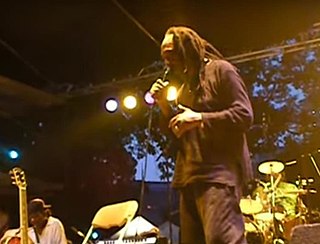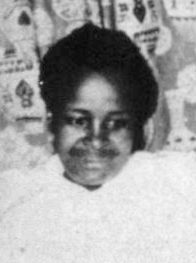
Harare, formerly known as Salisbury, is the capital and largest city of Zimbabwe. The city proper has an area of 982.3km2 (378.7 mi2), a population of 1,849,600 as of the 2022 census and an estimated 2,487,209 people in its metropolitan province. The city is situated in north-eastern Zimbabwe in the country's Mashonaland region. Harare is a metropolitan province, which also incorporates the municipalities of Chitungwiza and Epworth. The city sits on a plateau at an elevation of 1,483 metres above sea level, and its climate falls into the subtropical highland category.

Thomas Tafirenyika Mapfumo is a musician nicknamed "The Lion of Zimbabwe" and "Mukanya" for his immense popularity and for the political influence he wields through his music, including his sharp criticism of the government of former Zimbabwean president Robert Mugabe. He both created and made popular Chimurenga music, and his slow-moving style and distinctive voice is instantly recognisable to Zimbabweans.

Tsitsi Dangarembga is a Zimbabwean novelist, playwright and filmmaker. Her debut novel, Nervous Conditions (1988), which was the first to be published in English by a Black woman from Zimbabwe, was named by the BBC in 2018 as one of the top 100 books that have shaped the world. She has won other literary honours, including the Commonwealth Writers' Prize and the PEN Pinter Prize. In 2020, her novel This Mournable Body was shortlisted for the Booker Prize. In 2022, Dangarembga was convicted in a Zimbabwe court of inciting public violence, by displaying, on a public road, a placard asking for reform.

Oliver "Tuku" Mtukudzi was a Zimbabwean musician, businessman, philanthropist, human rights activist and UNICEF Goodwill Ambassador for Southern Africa Region.
Highfield is the second oldest high-density suburb or township in Harare, Zimbabwe built to house Rhodesians of African origin, the first being Mbare. Highfield was founded on what used to be Highfields Farm. It is of historical, cultural and political significance to Zimbabwe and is known as Fiyo in local slang. It is one of the birthplaces of the Zimbabwe African National Union and is home to several prominent people in the country such as Gregy Vambe and Oliver Mtukudzi, and formerly Robert Mugabe.

Robert Gabriel Mugabe International Airport, and formerly known as Harare International Airport and Salisbury Airport, is an international airport in Harare, Zimbabwe. It is the largest airport in the country and serves as the base of Air Zimbabwe. It is operated by the Civil Aviation Authority of Zimbabwe.

The Reserve Bank of Zimbabwe is the central bank of Zimbabwe and is headquartered in the capital city Harare.
Kubi Chaza Indi is a Zimbabwean development activist and businesswoman. Under her maiden name, Kubi Chaza, she was an actress in the United Kingdom, appearing in Live and Let Die in 1973 as a sales clerk serving James Bond. After returning to Zimbabwe, she and actor husband John Indi started a company making beauty products.
Articles related to Zimbabwe include:

Agnieszka Piotrowska is an author, academic and award-winning filmmaker, probably best known for her 2008 documentary Married to the Eiffel Tower, about women who fall in love with objects."
Bernard Thomas Gibson Chidzero was a Zimbabwean economist, politician, and writer. He served as the independent Zimbabwe's second finance minister.
Jit is a Zimbabwean film made in 1990, written and directed by Michael Raeburn. It is about a young man, nicknamed UK, who lives in Harare with his musician uncle, Oliver Mtukudzi, who plays himself. UK is knocked out when he falls out of a taxicab and then falls in love with the woman he gazes up at when he regains consciousness. He determines that he must marry her, but her father insists on a "bride price" in the form of an expensive stereo and cash. UK sets out to obtain these things, but has to appease his jukwa, who is visible only to him and wants him to give her beer and earn money to send to his parents in the countryside.
The following is a timeline of the history of the city of Harare, Zimbabwe.
Selmor Mtukudzi is a Zimbabwean musician and actress. She is the daughter of the late Zimbabwean music icon and national hero, Oliver Mtukudzi.

Oriah Anthony Gara was a Zimbabwean businessman and politician. He was a member of the House of Assembly of Zimbabwe for Mbare East from 1990 to 2000 and served as deputy minister of local government, rural and urban development from 1995 until 2000. Before entering Parliament, he was a member of the Harare City Council and served as mayor of Harare from 1985 to 1986.
Zimbabwe has an active film culture that includes films made in Zimbabwe during its pre- and post-colonial periods. Economic crisis and political crisis have been features of the industry. A publication from the 1980s counted 14 cinemas in Zimbabwe's capital city, Harare. According to a 1998 report only 15 percent of the population had been to a cinema. European and American films have been made on location in Zimbabwe as well as Indian films. American films are popular in Zimbabwe but face restrictions limiting their distribution.
Jesesi Mungoshi is a Zimbabwean actress. She made her debut appearance in 1989, in the film titled, African Journey.
Milton Park is a densely populated, inner city, mixed use suburb just west of central Harare, Zimbabwe. Due to its density, diversity and character it is often compared to The Avenues, Belgravia, Greendale, Eastlea and Highlands. Separated from the CBD by the A1 highway east, is it is usually considered to be bounded to the south by Princes Road, to the north by Cork Road, to the west by Warren Hills Golf Club.
Newlands is a low density, residential suburb located in eastern Harare, Zimbabwe.

Stella Madzimbamuto was a South African-born Zimbabwean nurse and plaintiff in the landmark legal case of Madzimbamuto v Lardner-Burke. Born as Stella Nkolombe in District Six of Cape Town in 1930, she trained as a nurse at South Africa's first hospital to treat black Africans, earning a general nursing and a midwifery certification. After working for three years at Ladysmith Provincial Hospital, she married a Southern Rhodesian and relocated. From 1956 to 1959, she worked as a general nurse at the Harare Central Hospital. In 1959, her husband, Daniel Madzimbamuto, was detained as a political prisoner. He would remain in detention until 1974, while she financially supported the family.









